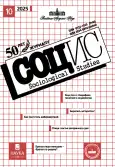RUSSIAN DIPLOMATS: TRANSFORMATION OF A PROFESSIONAL GROUP UNDER THE INFLUENCE OF HISTORICAL EVENTS OF THE FIRST HALF OF THE TWENTIETH CENTURY
- Autores: IVANOVA E.Y.1
-
Afiliações:
- Institute of Sociology of FCTAS RAS, Moscow, Russia
- Edição: Nº 10 (2025)
- Páginas: 103-116
- Seção: SOCIOLOGY OF PROFESSIONS
- URL: https://journal-vniispk.ru/0132-1625/article/view/351998
- DOI: https://doi.org/10.31857/S0132162525100091
- ID: 351998
Resumo
The article presents some results of the analysis of the features of the formation of a diplomats professional group in the context of social transformations in the process of historical development of Russia in the first half of the 20th century. The purpose of the study is to refute or confirm the hypothesis that social changes on the Russian soil (objective and subjective) do not have a decisive impact on the trajectories of intergenerational social mobility. The information base of the study is the biographical and encyclopedic reference books published in recent years about the last tsarist diplomats, the first diplomats of the Soviet era, career diplomats of the post-war years and modern representatives of the foreign ministry, publications on the problems of the formation of diplomacy in Russia, memoirs and interviews in the media of domestic diplomats. The relevance and novelty of the comprehensive study (in total, more than 4000 personalized data on domestic diplomats were analyzed) is associated with insufficient attention to the research devoted to this closed, small, elite group of professionals with significant educational, cultural and political capital, high status position and role in society. An original author’s approach to the study of the information array was used. The author analyzes educational and professional trajectories of different generations of diplomats, as well as the national, class and class composition of the Foreign Ministry, and vector of social mobility.
Palavras-chave
Sobre autores
E. IVANOVA
Institute of Sociology of FCTAS RAS, Moscow, Russia
Autor responsável pela correspondência
Email: ele6248@yandex.ru
Moscow, Russia
Bibliografia
- Белковец Л. П. Первые шаги советской дипломатии (из истории российского законодательства о дипломатическом праве) // Международное право. 2016. № 1. С. 42–79. doi: 10.7256/2306-9899.2016.1.17122.
- Григорьев Б. Н. Повседневная жизнь царских дипломатов в XIX веке. М.: Молодая гвардия, 2010.
- Демьяненко И. От Дипломатического агентства НКИД до Представительства МИД Российского государства. Историко-правовой очерк к 50-летию Представительства МИД в Санкт-Петербурге // Международная жизнь. 2017. № 2. С. 152–165.
- Докторов Б. З., Зборовский Г. Е. Поколенческий подход к современной отечественной социологии: общероссийские и региональные аспекты // Социологические исследования. 2021. № 11. С. 79–90. doi: 10.31857/S0132162500157429.
- Журавлев А. Ф. К статистике русских фамилий. I // Вопросы ономастики. 2005. № 2. С. 126–146.
- Зонова Т. В. Этапы становления российской дипломатической службы // Дипломатическая служба. М.: РОССПЭН, 2002. С. 3–22.
- Иванов Ю. В. Первые советские дипломаты. НКИД РСФСР / СССР. 1917–1941. М.: Перо, 2022.
- Иванов Ю. В., Иванова Е. Ю. Последние дипломаты Российской империи. 1900–1917. М.: Перо, 2021.
- Иванова Е. Ю. Социологический ретроспективный анализ принципов рекрутинга в дипломатические службы России // Теория и практика общественного развития. 2021. № 10(164). С. 49–62. doi: 10.24158/tipor.2021.10.7.
- Иванова Н. И. Немцы на дипломатической службе в Российской империи // Исторический путь России: из прошлого в будущее. В 3-х т. СПб., 2021. С. 161–167.
- Кларк Г. Отцы и дети. Фамилии и история социальной мобильности / Пер. с англ. Н. Эдельмана; научн. ред. пер. А. Володин. М.: Ин-т Гайдара, 2018.
- Ковалев А. Азбука дипломатии. М.: Международные отношения, 1993.
- Крыштановская О. В., Лавров И. А. (2023) Высшее образование в России: элитное vs элитарное? // Мир России. Социология. Этнология. Т. 32. № 4. С. 138–159. doi: 10.17323/1811-038X-2023-32-4-138-159.
- Кузнецов А. И. «Засилье» иностранцев на дипломатической службе российской империи: миф и реальность // Новая и новейшая история. 2014а. № 4. С. 104–109.
- Кузнецов А. И. Прообразы МГИМО: из истории специального дипломатического образования в России // Вестник МГИМО-Университета. № 1(34). 2014b. С. 64–71.
- Миронов Б. Н. Историческая социология России: в 2 ч. 2-е изд., испр. и доп. Ч. 1. Уч. для академ. бакалавр. М., 2017.
- Михайловский Г. Н. Записки: из истории российского внешнеполитического ведомства. 1914–1920. Т. 1. М.: Международные отношения, 1993.
- НКИД на этапе образования СССР // Очерки истории Министерства иностранных дел России. М.: Олма-пресс, 2002. Т. 2.
- Очерки истории Министерства иностранных дел России. Т. 1. 1860–1917 гг. М.: Олма-пресс, 2002. С. 587–593.
- Покатов Д. В. Роль социологии в формировании элитного образования в России: социальные практики, проблемы // Социология в изменяющемся научно-образовательном пространстве современного общества. Саратов: Саратовский источник, 2020. С. 193–199.
- С рубежей фронтовых на рубежи дипломатические / Под общ. ред. П. В. Стегния, Н. М. Бариновой. М.: Канон+, 2020.
- Чернявский С. И. Дипломатия России. Опыт Первой мировой войны. М.: ТД Алгоритм, 2016.









